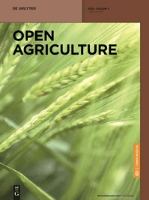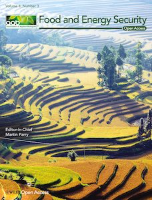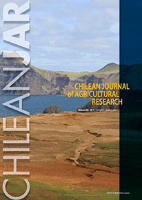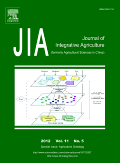
Open Agriculture
Scope & Guideline
Cultivating Knowledge for a Sustainable Future
Introduction
Aims and Scopes
- Sustainable Agricultural Practices:
Research focused on sustainable methods that enhance productivity while preserving the environment, including organic farming, agroecology, and integrated pest management. - Food Security and Nutrition:
Studies aimed at improving food security through innovative agricultural practices, crop diversification, and nutritional analysis of food products. - Technological Innovations in Agriculture:
Exploration of emerging technologies such as precision agriculture, remote sensing, and biotechnology to improve crop yield and farming efficiency. - Socioeconomic Factors in Agriculture:
Analysis of the socio-economic dynamics affecting agricultural practices, including farmer behavior, market access, and the impact of policies on agricultural development. - Environmental Impact Assessments:
Research assessing the environmental effects of agricultural practices and initiatives aimed at mitigating climate change and promoting biodiversity.
Trending and Emerging
- Climate Resilience Strategies:
A rising focus on research that explores adaptive strategies for agriculture in the face of climate change, including drought-resistant crops and sustainable water management. - Integration of Digital Technologies:
An increasing number of studies are investigating the use of digital tools, such as AI and IoT, to enhance farm management, crop monitoring, and supply chain efficiency. - Nutraceuticals and Functional Foods:
Growing interest in the nutritional and health benefits of agricultural products, particularly the development of functional foods and the role of bioactive compounds. - Agroecological Practices:
Emerging emphasis on agroecology as a holistic approach to farming that integrates ecological principles into agricultural production to promote sustainability. - Food Systems and Security Research:
A significant increase in studies addressing holistic food systems, including supply chain dynamics, food waste reduction, and the socio-economic aspects of food security.
Declining or Waning
- Traditional Farming Techniques:
Research on conventional farming methods has decreased as there is a growing emphasis on sustainable and modern practices that leverage technology and innovation. - Chemical Pesticide Use:
There is a noticeable decline in studies centered on synthetic chemical pesticides, reflecting a shift towards organic and integrated pest management strategies. - Single Crop Systems:
Less emphasis is placed on research involving monoculture practices as multi-crop systems and agro-biodiversity gain traction in promoting resilience in agriculture. - Livestock Production without Sustainability Focus:
Research focused solely on livestock production without considering sustainable practices is waning as the industry increasingly adopts more holistic approaches. - Static Economic Models:
Declining interest in static economic models that do not account for dynamic changes in market conditions and environmental factors affecting agriculture.
Similar Journals

JOURNAL OF AGRICULTURAL AND RESOURCE ECONOMICS
Fostering impactful research for a sustainable future.Journal of Agricultural and Resource Economics is a pivotal platform in the realm of agricultural and resource economics, published by the Western Agricultural Economics Association. Since its inception, the journal has embraced an Open Access model, fostering widespread dissemination of research findings to benefit both scholars and practitioners in the field. The journal operates within an impressive global ranking framework, resting in Q2 across several pertinent categories including Agronomy and Crop Science, Animal Science and Zoology, and Economics and Econometrics. With its ISSN 1068-5502 and E-ISSN 2327-8285, it has garnered attention for its rigorous academic standards and impactful contributions to the discourse on resource management and agricultural practices. Researchers, professionals, and students alike will find the journal's ongoing commitment to advancing knowledge invaluable, with publications that span from 1996 to 2024 capturing evolving trends and insights in the sector.

German Journal of Agricultural Economics
Driving Dialogue on Contemporary Agricultural ChallengesThe German Journal of Agricultural Economics, published by the esteemed DEUTSCHER FACHVERLAG GMBH, serves as a pivotal platform for the dissemination of research in the fields of Agricultural and Biological Sciences as well as Economics and Econometrics. Situated in Germany, this journal, with ISSN 0515-6866 and E-ISSN 2191-4028, has established a notable presence, reflected in its 2023 category quartiles—ranking Q2 in Agricultural and Biological Sciences (miscellaneous) and Q3 in Economics and Econometrics. With a converged publication timeline from 2011 to 2024, it aims to foster dialogue and research innovation related to agricultural economics, with an emphasis on contemporary challenges and advancements in the sector. The journal seeks to cater to a diverse audience, including researchers, professionals, and students, by providing access to high-quality, peer-reviewed articles that contribute to the ongoing discourse in these critical areas of study. Whether you are looking to keep abreast of the latest findings or seeking publishing opportunities, the German Journal of Agricultural Economics is an essential resource for anyone engaged in agricultural and economic research.

AGROCIENCIA
Elevating research to meet the challenges of agriculture.AGROCIENCIA, published by COLEGIO POSTGRADUADOS, is a key journal in the fields of agronomy, animal science, and environmental science in Mexico. With an ISSN of 1405-3195 and an E-ISSN of 2521-9766, this journal has been a crucial platform for disseminating research findings since its inception in 2000. Operating from Montecillo, Estado Mexico, it provides an outlet for scholars and practitioners to share innovations and insights that directly impact agricultural practices and environmental sustainability. Despite its current categorization in the Q4 quartile across multiple disciplines, AGROCIENCIA strives to elevate the quality and reach of research, fostering a collaborative approach to tackle pressing issues within the agricultural sciences. Access options are primarily through institutional subscriptions, allowing for a diverse audience of researchers, professionals, and students to engage with the latest studies aimed at advancing knowledge in the agricultural sector. As the journal converges towards its 2024 milestone, it remains dedicated to enhancing scientific inquiry and promoting effective solutions within its discipline.

Food and Energy Security
Transforming Challenges into Opportunities in Food and Energy SecurityFood and Energy Security, an esteemed journal published by WILEY, is dedicated to advancing the fields of food science, agriculture, and renewable energy. Since its inception in 2012, this open-access journal has provided a platform for groundbreaking research and innovative practices that address global challenges related to food production and energy sustainability. With an impressive impact factor reflected in its Q1 quartile rankings across notable categories such as Agronomy and Crop Science and Food Science, this journal is instrumental for researchers and practitioners alike who are focused on enhancing food security and promoting sustainable energy solutions. The journal's scope encompasses multidisciplinary approaches and encourages submissions that explore the intersection of food systems and energy dynamics, ensuring relevance in the evolving landscape of environmental science and policy. By offering open access to its publications, Food and Energy Security commits to making vital research accessible, fostering informed dialogue and collaboration among scholars, policymakers, and the agrifood industry worldwide.

Chilean Journal of Agricultural Research
Empowering research in agronomy and animal science.Chilean Journal of Agricultural Research, published by INST INVESTIGACIONES AGROPECUARIAS - INIA, is a premier academic journal dedicated to the advancement of knowledge in the fields of Agronomy, Crop Science, Animal Science, and Zoology. With an ISSN of 0718-5839, this journal serves as a vital resource for researchers, professionals, and students alike, facilitating the dissemination of impactful research from Chile and around the globe. Classified as a Q2 journal in both Agronomy and Crop Science and Animal Science and Zoology as of 2023, it occupies a significant position in academic rankings, highlighted by its Scopus metrics, which recognize its contributions to the field. The journal operates under an Open Access model, ensuring that valuable research is accessible to a wider audience, thereby promoting innovation and collaboration. With a converged publication timeline from 2008 to 2024, the Chilean Journal of Agricultural Research continues to enhance understanding and foster advancements in agricultural science, thus playing an instrumental role in addressing contemporary challenges in food security and sustainable practices.

Journal of Agriculture and Environment for International Development
Navigating the Path to Sustainable Development TogetherJournal of Agriculture and Environment for International Development, published by AGENZIA ITALIANA COOPERAZIONE SVILUPPO-ITALIAN DEV COOP AGENCY, is a vital platform advancing research at the intersection of agricultural practices, environmental sustainability, and international development. Since its inception, this Open Access journal has aimed to disseminate knowledge and innovative strategies that address global challenges in the agri-environment sector. With ISSN 2240-2802, this esteemed publication is situated in Italy and has maintained an unwavering commitment to accessibility since 2011, encouraging widespread engagement amongst researchers and practitioners. Although currently ranked in the Q4 quartile across various categories including Agricultural and Biological Sciences and Environmental Science, the journal is dedicated to covering crucial topics that contribute to sustainable development, thus serving as an invaluable resource for scholars and policymakers alike. The convergence years from 2016 to 2024 reflect the journal's adaptive approach to evolving global trends, ensuring its relevance in a rapidly changing academic landscape.

Journal of Integrative Agriculture
Transforming Agricultural Science with Integrative ApproachesJournal of Integrative Agriculture, published by Elsevier Science Ltd, stands as a leading platform for innovative research at the intersection of agricultural sciences. With a significant focus on integrative approaches, this journal has established itself within the academic community, reflecting its excellence through impressive Impact Factor rankings and a consistent Q1 category status in multiple fields, including Agronomy, Animal Science, and Ecology. The journal spans a wide range of topics, making it a critical resource for exploring advancements in Biochemistry, Food Science, and Plant Science. With its diverse Scopus rankings—from Rank #3 in Food Animals to Rank #14 in Animal Science—it serves as a vital repository for cutting-edge research that influences both scientific inquiry and practical applications in the agricultural domain. Operating from China and accessible through open access options, the Journal of Integrative Agriculture aims to foster collaborative research and knowledge exchange among scientists, professionals, and students worldwide, supporting the growth and sustainability of agricultural practices.

Studies in Agricultural Economics
Exploring the Intersection of Agriculture and EconomicsStudies in Agricultural Economics is a premier journal published by AGRARGAZDASAGI KUTATO & INFORMATIKAI INTEZET in Hungary, focusing on innovative research in the interdisciplinary fields of agricultural, biological, and economic sciences. Since becoming an Open Access journal in 1997, it has aimed to enhance the visibility of agricultural economics scholarship while promoting global engagement among researchers, practitioners, and policymakers. With its robust Q2 and Q3 rankings across varied categories including Development and Geography, this journal serves as a significant platform for disseminating cutting-edge studies that address crucial issues in agriculture and rural development. The journal's continuous publication since 2011 until 2024 exemplifies its commitment to providing timely insights into evolving agricultural challenges. With a strong Scopus ranking across multiple domains, particularly in the social sciences and agricultural sectors, it stands as a vital resource for anyone looking to advance knowledge and practice in these critical areas.

TROPICAL AGRICULTURE
Transforming tropical agriculture through scholarly insights.Tropical Agriculture is a reputable journal dedicated to advancing knowledge and research in the fields of Agronomy and Development, with a particular emphasis on tropical farming practices and agricultural innovation. Published by the University of the West Indies, this journal serves as a crucial resource for researchers, professionals, and students engaged in the complexities of agriculture in the tropics. Established in 1979, it has witnessed significant contributions and continues to facilitate scholarly discussions through its quarterly publications. While the journal currently holds a Q4 ranking in both the Agronomy and Development categories, its commitment to fostering research excellence positions it as a pivotal platform for emerging studies and regional agricultural advancements. Although not an open-access publication, it provides critical insights and localized research that greatly benefit the agricultural community, particularly within the Caribbean context. Researchers and professionals in the field can rely on this journal for insightful content on tropical agricultural challenges and developments, enhancing knowledge dissemination and application across related disciplines.

Future of Food-Journal on Food Agriculture and Society
Shaping Tomorrow's Food Landscape through ResearchThe Future of Food-Journal on Food Agriculture and Society, published by Kassel University Press GmbH, serves as a vital platform for emerging research at the intersection of food, agriculture, and societal impacts. With an ISSN of 2197-411X and operating within the realms of Agronomy, Ecology, and Food Science, this journal is pivotal for researchers and professionals aiming to address contemporary challenges in the food sector. Although currently ranked in the fourth quartile across its scholarly categories (2023), the journal showcases a wealth of innovative studies, critical analyses, and global perspectives that strive to enhance our understanding of sustainable agriculture practices, food security, and environmental stewardship. The Open Access format encourages wide dissemination and engagement with research findings, making it an essential resource for students and academics alike. As the journal converges from 2013 to 2024, it aims to foster discussions that will shape the future of food systems worldwide.